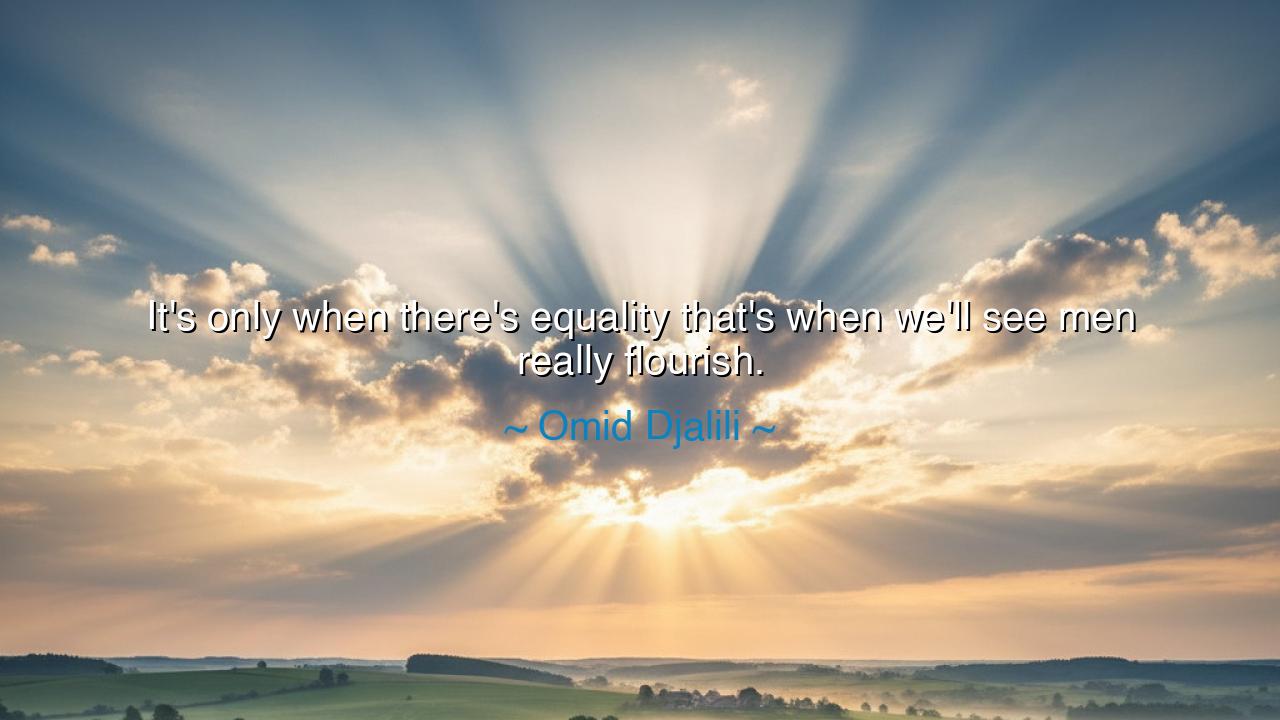
It's only when there's equality that's when we'll see men really






"It's only when there's equality that's when we'll see men really flourish." These words from Omid Djalili hold a profound truth that has resonated through the ages. The essence of the statement is a powerful reflection on the nature of equality, not just as a moral ideal but as the very foundation for human flourishing. In every era, from the ancient civilizations to the modern world, the concept of equality has been central to the progress and growth of societies. Djalili’s words suggest that true progress cannot be achieved when individuals or groups are oppressed or marginalized. It is only when all are given equal opportunity, regardless of gender, race, or status, that humanity as a whole can reach its highest potential.
Consider the ancient Greek philosophers, particularly Socrates, who explored the nature of justice and equality in his dialogues. For Socrates, the ideal state was one where all individuals, regardless of their origin or social standing, were given the opportunity to contribute to society. In his vision, equality wasn’t just about treating all people the same, but about recognizing the unique contributions each person could make, regardless of their background. In Plato’s "Republic", Socrates advocates for a society where individuals are not judged by social class or birth, but by their abilities and virtue. His philosophy reflects the ancient understanding that human flourishing requires a society where equality is not just a distant dream but a foundational principle.
This idea of equality fostering human growth is mirrored in the history of Rome, particularly during the era of the Roman Republic. The story of Cicero, the renowned orator and statesman, illustrates how equal opportunities in a society can lead to the flourishing of individuals who would otherwise be left behind. Cicero, born into a non-aristocratic family, rose to become one of Rome's most influential figures. His ascent was not solely due to wealth or birthright, but to his talent, ambition, and the opportunities afforded to him in a system where merit was supposed to determine one’s place in society. Cicero’s rise represents a society that allowed for the potential of all its citizens to flourish, given the right conditions of equality and opportunity.
But Djalili's message transcends ancient history. Consider the American Civil Rights Movement in the mid-20th century, where the fight for equality was not just a political or legal struggle but a battle for human dignity. Martin Luther King Jr., a central figure in this movement, spoke of his dream of a nation where equality would allow all individuals, regardless of their race, to flourish. His famous speech at the Lincoln Memorial highlighted the deep connection between freedom, justice, and equality. He understood that only through equal rights could a nation truly be united and allow its citizens to reach their full potential. When people are freed from oppression, they can contribute to society not just as citizens, but as individuals with unique talents, perspectives, and ideas.
Similarly, the women's suffrage movement of the 19th and early 20th centuries was driven by the realization that gender equality was essential for the flourishing of society. Figures like Susan B. Anthony and Elizabeth Cady Stanton fought not only for voting rights but for the broader recognition of women as equal participants in the intellectual, political, and economic spheres of life. The advancement of women in the modern era has been a vital force in shaping societies where the full potential of half of the population can finally be recognized and nurtured. The economic, social, and cultural contributions of women, once suppressed, have now become a cornerstone of global progress.
The lesson that Omid Djalili imparts is both timeless and urgent: true flourishing comes only when we allow all individuals, regardless of their background, to have equal access to opportunity. Equality is not a privilege granted to the few, but a right that, when fully realized, benefits all. When people are freed from the chains of oppression—whether those chains be social, economic, or cultural—they can rise to their highest potential. Flourishing is a communal experience, not an individual one. It is only in societies where equality is deeply embedded that every individual can contribute to the greater good.
As you reflect on this wisdom, consider your own role in fostering equality in the world around you. Are you helping to create a society where all can flourish, or are you perpetuating systems that keep people from reaching their potential? It is your actions and beliefs that contribute to the world’s progress or stagnation. Ensure that you actively work to promote equality, to open doors for those who have been excluded, and to challenge the structures that limit human potential. The flourishing of humanity lies in our collective ability to embrace the dignity of every individual, allowing them the freedom to grow, learn, and contribute to the world. Only through equality, Djalili reminds us, can we truly reach our full potential as a society and as individuals.






AAdministratorAdministrator
Welcome, honored guests. Please leave a comment, we will respond soon